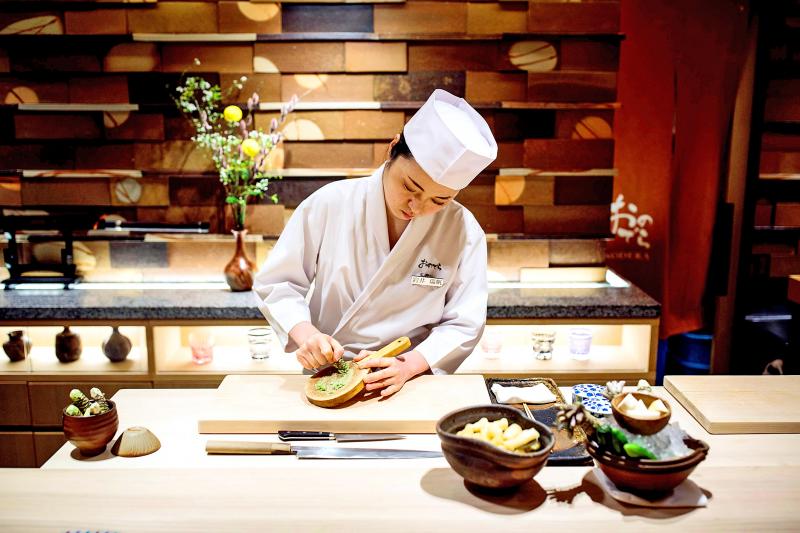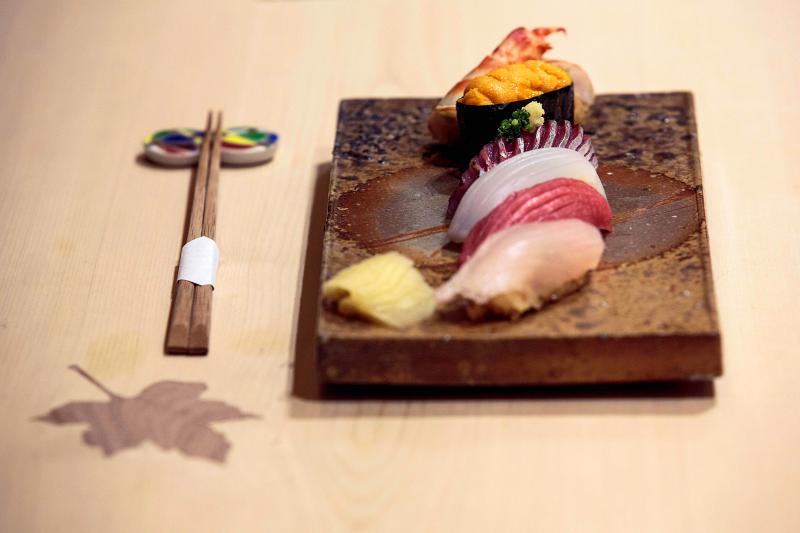Women have warm hands, their periods alter their sense of taste and they can’t work long hours — just some of the claims from those in Japan who believe women can’t be sushi chefs.
But a growing number of women in the country determined to shatter those myths are training and working as sushi chefs in some of Japan’s most revered restaurants and institutions.
Mizuho Iwai is a trainee at the upscale Onodera restaurant in Tokyo’s Ginza, a ritzy neighborhood home to some of the world’s top-ranked sushi restaurants.

Photo: AFP
In an industry where women are still rarely seen, she knew she would be an anomaly.
“I think there are a few [female] chefs but it’s rare. But I wanted to challenge things because of that,” the 33-year-old apprentice said. “I thought: this is my mission.”
And at Onodera, she’s not totally alone, there was one other woman among the 10 apprentices training at the restaurant before it recently closed temporarily over the COVID-19 outbreak. All 10 of the restaurant’s chefs are men.

Photo: AFP
The work can be grueling and requires years to master. Apprentices must learn everything from the names of different types of fish to removing scales and slicing properly. They are even instructed on how to correctly enter through the traditional drapes inside Onodera, by lifting and parting them with an elbow.
“My colleagues have accepted me,” said Iwai, who decided to become a sushi chef after cooking in small Japanese restaurants.
“They don’t treat me specially just because I’m a woman,” she added, after learning how to slice Japanese horse mackerel. “They teach me as a person.”
‘STRONG RESISTANCE’ TO WOMEN
The world of washoku, or Japanese cuisine, has long been dominated by men, more so than Italian or French cuisine, according to Fumimasa Murakami, a 54-year-old teacher at Tokyo Sushi Academy, which was still running a scaled back schedule of classes earlier this month.
There is no official data on the gender breakdown of sushi chefs in Japan, but Murakami estimates women make up “less than 10 percent.”
“[Resistance] against female chefs remains strong in Japanese cuisine, including sushi,” he said.
“Customers who don’t want a female chef at the counter do exist,” he added. “Older customers in particular have difficulty accepting it.”
But even sushi chefs have been known to repeat claims that women’s hands are too warm to keep raw fish fresh, or that their periods alter their sense of taste. Others say the job is unsuitable for women because of the long and late hours.
“In Japan, it is still strongly believed that it is women who take care of family. But sushi chefs work in the evening so it’s difficult for women,” said Yuki Noguchi, a 32-year-old former primary school teacher who finished her eight-month sushi chef training at the academy in December.
“That’s why I think the number of women who want to become a sushi chef is small in the first place,” she said.
PUNISHING TRAINING
Onodera’s head chef Akifumi Sakagami said the sushi world’s reputation for punishing training drove away women but also young people of both genders.
“I think women need a lot of courage to jump in,” the 46-year-old said.
Sakagami started as an apprentice more than 30 years ago in the northern city of Sapporo, when female chefs and trainees were essentially nonexistent.
“When I joined the industry, the working conditions in the washoku world were tough,” he said, as he showed Iwai how to thinly slice tuna and taught her how to properly peel freshly steamed shrimp. “It was long working hours with low pay. It was physically tough.”
“But the work environment is changing along with other changes in society. I think it’s getting better for both men and women,” he added.
He welcomes those changes and says being a chef depends not on gender but “competence, talent and how much effort people put in.” Fuka Sano, the other female apprentice at Onodera, said she didn’t think too much about the lack of women in the field when she decided to become a sushi chef.
“I guess women think a sushi chef is a man’s job because there are so few women,” the 18-year-old said.
But she was determined to enter the profession, after a formative trip to London.“I’m sorry to say this but sushi at chain restaurants in Britain didn’t seem appealing!” she laughed. She hopes to improve the standards of Japanese food overseas.
And Sano wants her food to be judged on its own merits, without regard for her gender.
“I want them to come (to the restaurant) for food,” she said, not “because I’m a woman.”
Her fellow apprentice Iwai hopes women like her are helping change the industry.
“It doesn’t matter whether the chef is a man or woman,” she said. “I hope the fixed image will disappear and there will be more options for women. It’s really a fun job.”

April 14 to April 20 In March 1947, Sising Katadrepan urged the government to drop the “high mountain people” (高山族) designation for Indigenous Taiwanese and refer to them as “Taiwan people” (台灣族). He considered the term derogatory, arguing that it made them sound like animals. The Taiwan Provincial Government agreed to stop using the term, stating that Indigenous Taiwanese suffered all sorts of discrimination and oppression under the Japanese and were forced to live in the mountains as outsiders to society. Now, under the new regime, they would be seen as equals, thus they should be henceforth

Last week, the the National Immigration Agency (NIA) told the legislature that more than 10,000 naturalized Taiwanese citizens from the People’s Republic of China (PRC) risked having their citizenship revoked if they failed to provide proof that they had renounced their Chinese household registration within the next three months. Renunciation is required under the Act Governing Relations Between the People of the Taiwan Area and the Mainland Area (臺灣地區與大陸地區人民關係條例), as amended in 2004, though it was only a legal requirement after 2000. Prior to that, it had been only an administrative requirement since the Nationality Act (國籍法) was established in

With over 80 works on display, this is Louise Bourgeois’ first solo show in Taiwan. Visitors are invited to traverse her world of love and hate, vengeance and acceptance, trauma and reconciliation. Dominating the entrance, the nine-foot-tall Crouching Spider (2003) greets visitors. The creature looms behind the glass facade, symbolic protector and gatekeeper to the intimate journey ahead. Bourgeois, best known for her giant spider sculptures, is one of the most influential artist of the twentieth century. Blending vulnerability and defiance through themes of sexuality, trauma and identity, her work reshaped the landscape of contemporary art with fearless honesty. “People are influenced by

Three big changes have transformed the landscape of Taiwan’s local patronage factions: Increasing Democratic Progressive Party (DPP) involvement, rising new factions and the Chinese Nationalist Party’s (KMT) significantly weakened control. GREEN FACTIONS It is said that “south of the Zhuoshui River (濁水溪), there is no blue-green divide,” meaning that from Yunlin County south there is no difference between KMT and DPP politicians. This is not always true, but there is more than a grain of truth to it. Traditionally, DPP factions are viewed as national entities, with their primary function to secure plum positions in the party and government. This is not unusual